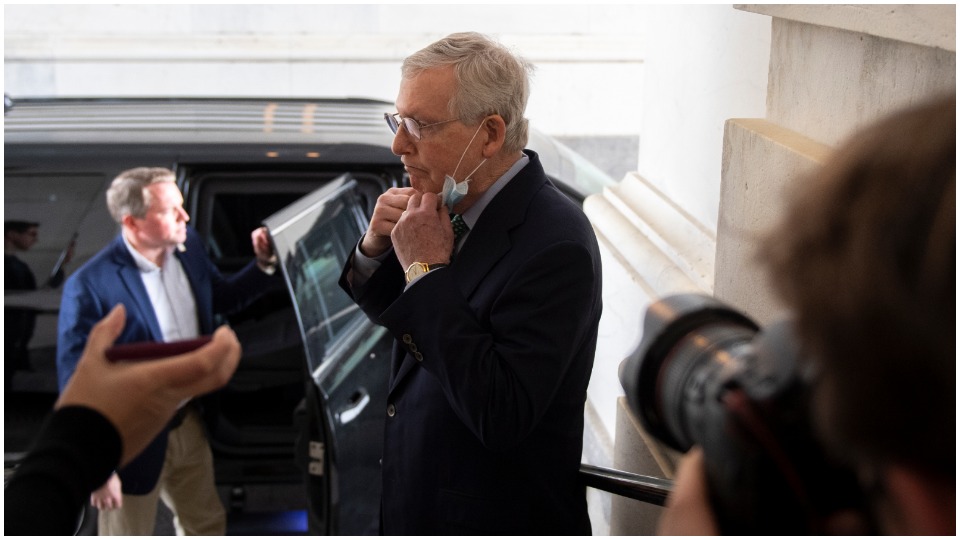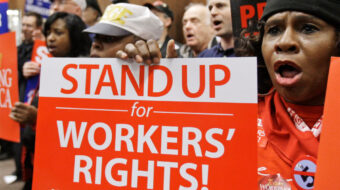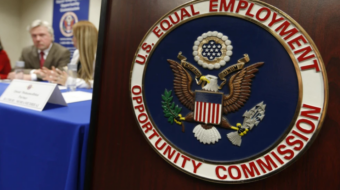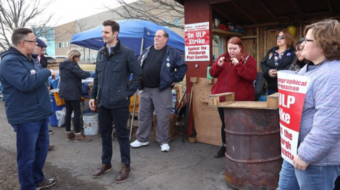
WASHINGTON—If you go to work and get sick from coronavirus on the job, because of little protective gear and no social distancing, Mitch McConnell wants to make sure your boss walks, scot-free.
That’s his “line in the sand” in the next economic aid package to deal with the coronavirus pandemic and its massive closures. The GOP Senate Majority Leader from Kentucky wants to ban all lawsuits from workers, or their heirs, who get sick from the virus while on the job.
All the boss has to do is claim he was following Centers for Disease Control “guidelines” designed to cut down coronavirus exposure, such as providing personal protective equipment (PPE) or enforcing social distancing. The guidelines, by the way, don’t have the force of law.
Needless to say, National Nurses United—whose members are among those most at risk from that very coronavirus threat—has hit the roof. Service Employees President Mary Kay Henry, whose union also includes thousands of nurses, called McConnell’s scheme “inhumane.”
“The loosened guidelines are dangerous, and risk exposing other workers and the public to infection, with supposed mitigation measures that are far less effective in reducing the threat of spreading the virus,” said NNU Executive Director Bonnie Castillo, RN, in a statement.
And a wide-ranging coalition of groups, including the AFL-CIO, banded themselves together into a “COVID Coalition” to oppose letting business off the hook. COVID-19 is the official name for the coronavirus, which has killed thousands of workers among the more than 69,000 total nationwide as of the morning of May 5. Some 1.2 million people have tested positive for the coronavirus in the U.S.
“We strongly oppose any legislation that would establish nationwide immunity for businesses that operate in an unreasonably unsafe manner, causing returning workers and consumers to risk COVID-19 infection,” the coalition’s letter said. “Removing legal accountability for businesses not only would jeopardize the health and safety of workers, but it would also jeopardize everyone who enters those workplaces. This would be extremely damaging to the nation’s economic recovery.
A wide-ranging coalition of groups, including the AFL-CIO, have banded together into a “COVID Coalition” to oppose letting business off the hook.
“Legal liability is one of the most powerful incentives we have to insure businesses operate safely,” added the group, which also includes the Teamsters, the National Lawyers Guild, the Asian-Pacific American Labor Alliance, and the National Consumers League.
“Hardworking Americans are putting their lives on the line for us. The very least our elected officials can do is to ensure that employers are doing all they can to protect these workers. But right now, that isn’t happening. That’s why it is important for Congress to act quickly to change it,” said Teamsters President Jim Hoffa, a point he applies to protecting workers’ health and safety overall, not just the lawsuit ban.
McConnell’s brainstorm will hit the Senate floor when the next coronavirus economic relief bill does. It comes straight from recommendations by the U.S. Chamber of Commerce and the right-wing Heritage Foundation think tank. It also tracks his past positions aiding and abetting his corporate contributors—who have given his campaigns millions of dollars during his career—while stiffing workers.
Besides the Chamber and Heritage, nursing home lobbies are campaigning to escape, too, though 16,000 patients and hundreds of their workers have died. There’s so little protection that AARP reports workers in 64 Illinois nursing homes plan to strike this week for PPE and hazardous duty pay.
McConnell has another ally, too: GOP President Donald Trump.
“We are trying to take liability away from these companies,” Trump said in response to a reporter’s question on the subject on May 1. “We just don’t want that because we want the companies to open and to open strong. But I’ll get you a legal opinion on that.”
McConnell called the lawsuit ban “an urgent need” and, crying crocodile tears, claimed he’s trying to protect workers from “opportunistic lawsuits.”
“While our nation is asking everyone from frontline healthcare professionals to essential small-business owners to major employers to adapt in new ways and keep serving, a massive tangle of federal and state laws could easily mean their heroic efforts are met with years of endless lawsuits,” he proclaimed.
“We cannot let that happen. Our nation is facing the worst pandemic in over a century and potentially the worst economic shock since the Great Depression. Our response must not be slowed, weakened, or exploited to set up the biggest trial lawyer bonanza in history.”
The Chamber of Commerce said the lawsuits could be the biggest problem business faces as the economy struggles back from coronavirus-caused closures and subsequent depression. Its memo, quoted by several news services, indicates—no great surprise—that not all businesses are following the CDC guidelines, a point easily seen in U.S. meat and poultry production plants.
And Heritage, in a special report on what to do in the coming economy, “recommends Congress should expand liability protections associated with the coronavirus. Congress should create a ‘safe harbor’” against lawsuits “for businesses and workers that follow CDC guidance and proper testing protocol in good faith.”











